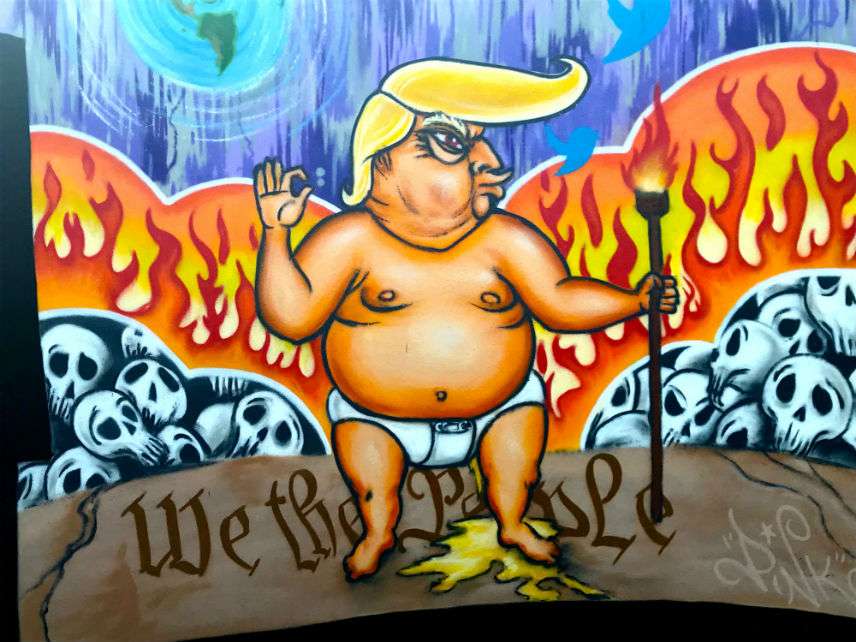Tomorrow Is the Most Important Election of Our Lifetime. Don't Let Trump Denialists Tell You Otherwise.
Trump is a uniquely awful president who has changed the entire political conversation and not for the better

It has become fashionable for right-wing Trump apologists to mock the notion that the midterms tomorrow are the most important elections in our lifetime. The Federalist's David Harsanyi, in fact, rattled off a list of politicos who'd claimed exactly this when they were running, but nothing really changed one way or another once they were elected. Folks like him, I note in The Week this morning, argue that if you look past Trump's foul personality and examine his actual policies, he's really not that bad. He has cut taxes, deregulated the economy, and made solid judicial appointments. He may be belligerent, but he hasn't started any big new wars; he may call the media the "enemy of the people," but he hasn't jailed dissidents and dissenters; he may talk tough on immigration and border security, but so did Bill Clinton. They also think his vile blood-and-soil nationalist rhetoric has nothing to do with the recent synagogue shooting, and those who claim otherwise are simply suffering from "Trump Derangement Syndrome." As far as they're concerned, America's political system has managed to temper Trump's worst authoritarian instincts and harness his better ones. Hence, not much is at stake in this election. The republic won't collapse regardless of the outcome.
But this is Trump denialism, I note:
Trump is a uniquely horrid president who has already had a transformative effect on America's discourse, institutions, policy, and politics—and not for the better. It might sound like a cliché, but he is changing "who we are."
Trump blares racism from a bullhorn—calling Hispanic immigrants "rapists" and "criminals" and mounting a last-minute fear campaign depicting the approaching migrant caravan of helpless asylum seekers as invaders who would go on a "cop-killing spree." The Trump administration tears suckling infants from the breasts of migrant moms and puts them in detention camps thousands of miles away. Trump has threatened to scrap birthright citizenship by executive order. He has mounted an all-out administrative assault on legal immigration, pardoned Arizona's brutal sheriff Joe Arpaio, and is deploying 15,000 military troops to stop a peaceful migrant caravan.
Trump started a trade war with the Middle Kingdom by imposing hundreds of billions in tariffs, all while threatening to tear down global rules of trade that keep the worst protectionism of other countries in check. He rails against the institution of a free press and openly applauds violence against reporters and political opponents. He has stomped on other bedrock checks and balances too, including relentlessly attacking executive agencies such as the FBI because they have the temerity to investigate him—never mind that keeping a check on public corruption is one of the few vital functions they serve.
Trump's predecessors have pursued some of these wrong-headed policies. But he is a bad combination of all of them, taking things to a whole new level of grotesqueness. And just because Trump can't deliver on his ludicrous threats—such as scrapping birthright citizenship by executive order—doesn't mean they have no impact. At the very minimum, they inflame public opinion and shift the Overton window for legislative nastiness. Indeed, literally hours after Trump floated his idea on twitter, South Carolina Sen. Lindsey Graham pledged to introduce legislation to end this "absurd policy" along the same lines as the proposed executive order.
Nor will it do to claim that Trump's incendiary rhetoric against immigrants, minorities, and others plays no role in inciting violence against them. Political leaders wield enormous powers to temper—or incite—the hot passions of their followers. If 9/11 did not result in the widespread bloodshed of Muslims in America, it was largely because George W. Bush declared that Islam was not America's enemy and visited a mosque within days of the attack. If blacks in South Africa did not go after their white rulers with pitchforks and swords when apartheid ended, it was in no small part because of Nelson Mandela's call for forgiveness and healing.
It is willful blindness to maintain that social media and other mobs aren't affected by verbal incitement. Is it such a stretch to suggest that when Trump builds an electoral strategy around depicting migrants as "invaders"—terminology borrowed from the right's fever swamp—and "cop killers," some worked up Minuteman vigilante won't feel like a hero when he takes matters into his own hands? Words are not conduct but they are meant to affect conduct (or they are meaningless and pundits should pack up and find another line of business). Our country has a bedrock—and noble—commitment to the First Amendment that gives officials legal immunity to throw verbal matches into a political tinderbox. But we should still be alarmed when they do so.
In fact, since I wrote this, an armed band of Minutemen has headed to the Southern border to stop the caravan.
Go here to read the piece.
Update: A link to the Harsanyi piece, which ran at reason.com, has been added here.


Show Comments (235)